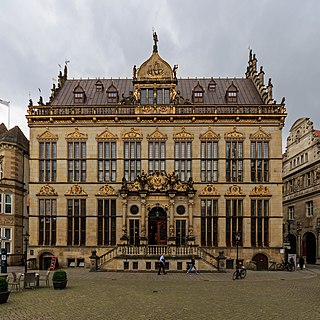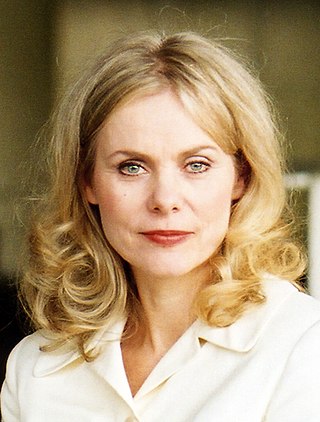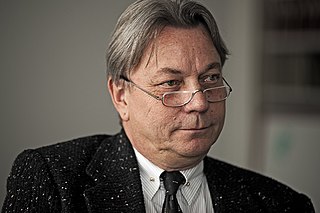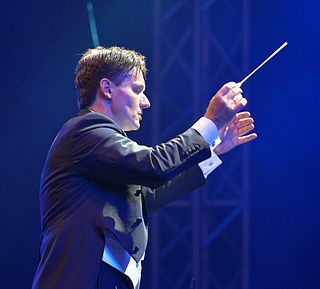
The Komische Oper Berlin is a German opera company based in Berlin. The company produces operas, operettas and musicals.

The Leipzig Opera is an opera house and opera company located at the Augustusplatz and the Inner City Ring Road at its east side in Leipzig's district Mitte, Germany.

The Oper Frankfurt is a German opera company based in Frankfurt.

Opernwelt is a monthly German magazine for opera, operetta and ballet. It includes news about current performances, portraits of composers and performers, articles about opera houses, performance spaces, and contemporary and historical subjects from the world of opera and classical music. It reviews recordings and books and publishes monthly schedules of German and international opera houses. The magazine's website offers full text search for past issues. A year book is published every October.

The Schütting, situated on the Marktplatz in Bremen, initially served the city's merchants and tradesmen as a guild house. In 1849, it became Bremen's chamber of commerce. Since 1973, it has been under monument protection. It lies on the south site of the Bremen marketplaces directly across from the town hall.

The Theater am Goetheplatz, also incorrectly known as the Goethetheater, is the main theatre of the city of Bremen in the north of Germany, the main venue of Theater Bremen. Completed in 1913 in the Neoclassical style, it is located in the cultural district to the east of the old town. After reconstruction with major extensions after the Second World War, it was fully modernized in 2004. Since 2005, it has been a listed building.
Stefan Herheim, is a Norwegian opera director, based in Germany.
Hans Wallat was a German conductor, GMD in Bremen, at the Nationaltheater Mannheim, Theater Dortmund and Deutsche Oper am Rhein. A specialist for the stage works of Richard Wagner, he appeared at the Bayreuth Festival and internationally.
Johannes Martin Kränzle is a German baritone in opera and concert who has made an international career. For years a member of the Oper Frankfurt, he was chosen as Singer of the Year in 2011 after creating the leading role in Wolfgang Rihm's Dionysos at the Salzburg Festival. He made his debut at the Royal Opera House as Don Alfonso in Mozart's Così fan tutte, and at the Bayreuth Festival as Beckmesser in Wagner's Die Meistersinger von Nürnberg in 2017.
Christof Loy is a German stage director especially for opera, whose work received several awards. A freelance director, he has staged operas from Baroque to premieres of new works at major European opera houses and festivals. He is known for directing works by Mozart.
Tobias Kratzer is a German stage director, especially of opera, who has worked internationally after winning a competition in Graz with two entries in 2008. He has staged works by Verdi and Wagner, but also contemporary music. He directed Wagner's Tannhäuser for the 2019 Bayreuth Festival.
Günter Krämer is a German stage director, especially for opera, and a theatre manager who has staged internationally.
Alfred Kirchner is a German actor, theatre director and theatre manager who is based in Berlin. He worked at theatres such as Theater Bremen, Schauspielhaus Bochum, the Burgtheater in Vienna and the Staatliche Schauspielbühnen Berlin, before turning to freelance work. He has staged productions in Europe and North America, including several world premieres of both drama and opera. He directed the premiere of Martin Walser's Ein Kinderspiel in Stuttgart in 1971, the U.S. premiere of Henze's We Come to the River at the Santa Fe Opera in 1984, and the premiere of Hans Zender's Stephen Climax at the Oper Frankfurt in 1986. In 1994, he staged Wagner's Der Ring des Nibelungen at the Bayreuth Festival.
ORPHEUS – Oper und mehr is a bimonthly special interest magazine from Germany that deals with opera, music theatre and culture.

The Bremer Philharmoniker is the official orchestra of the Free Hanseatic City of Bremen. In addition to the music theatre in the Theater Bremen they organise 28 Philharmonic concerts per season, various special, benefit and chamber concerts as well as many projects in the field of music education. Christian Kötter-Lixfeld is the artistic director of the Bremen Philharmonic Orchestra, and Marko Letonja has been its Generalmusikdirektor since the 2018/2019 season.
Herbert Schwarzwälder was a German historian. With his decades of work and his extensive publications, he has had a major influence on the research and communication of the History of the city of Bremen.

Kirsten Harms is a German theatre director and manager.

Georg Quander is a German opera and film director, music journalist, writer and culture manager. From 1991 to 2002, he was artistic director of the Deutsche Staatsoper Berlin. From 2005 to 2013, he was councillor for arts and culture of the city of Cologne. Since 2018, he has been the artistic director of the Musikkultur Rheinsberg gGmbH.

Stefan Klingele is a German conductor. He has been music director and chief conductor of the Musikalische Komödie in Leipzig since 2015.
Kristo Šagor is a German playwright and director. He has received numerous awards, and his plays Dreier ohne Simone, FSK 16 and Trüffelschweine are now among the most frequently performed plays in German-speaking countries.













